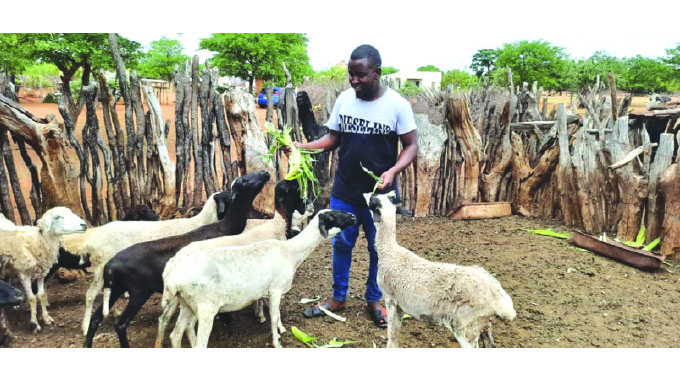Mudau, man with strong passion for livestock farming from a tender age

Mashudu Netsianda, Senior Reporter
AS a boy growing up in Lutumba Village in Beitbridge District, Matabeleland South Province, Mr Phumudzo Mudau (29), developed a strong passion for livestock farming at a tender age.
He drew his inspiration from his late father, a successful farmer from whom he learnt much about the practicalities of livestock production.
His father kept cattle, sheep and goats at his plot in Lutumba.
When he was only 16, Mr Mudau started reading a lot of books and other material related to sheep and goat rearing, which somewhat helped him acquire basic knowledge of livestock farming.
After finishing Ordinary Levels in 2010, Mr Mudau decided to pursue his childhood dream by venturing into livestock production starting with goats.
To add value to goat farming, he decided to expand to include sheep, starting off with a ram and three ewes bought from other farmers.
He got one of the ewes from his late grandmother after exchanging it with a doe.
Today, Mr Mudau has accumulated 42 sheep and his ultimate goal is to enhance the quality of his flock and subsequently building it up to 100 animals by year-end.
Mr Mudau sells his sheep locally, targeting individuals, farming co-operatives and shops.
Through his successful sheep farming business, he has managed to buy a car, which he uses for mobility purposes so that he is able to effectively monitor his project.
“I was inspired by my late father who was a successful livestock farmer.
I remember as a boy, I would spend the better part of the day out in the bush with my cousins where we would be herding cattle and that is how I ended up falling in love with livestock,” he said.
During school holidays, Mr Mudau would spend most of his time tending to his father’s goats and sheep as well as reading books on livestock farming.
“Looking after my father’s sheep and goats as a boy boosted my confidence.
It was most probably the push I needed to venture into this sheep farming business.
I have actually seen an opportunity in sheep farming business,” he said.
“In retrospect, I should have started my own farming business immediately after finishing school, but unfortunately I didn’t have enough capital until 2016 when I managed to raise money and started with a ram and three ewes.”
Mr Mudau said through sheep farming, his financial position had improved so much such that he was now planning on expanding the venture.
He however, said limited space was a hindrance to his plans.
“My only challenge is inadequate land to expand my project.
Right now, I don’t have enough space because as the population grows there will be a compelling need to create a lot of feedlots for my sheep,” he said.
Mr Mudau said lambs are weaned at eight to 10 weeks of age and then kept for 42 days before being sold at a live weight of between 25kg and 30kg to consumers at between R900 and R1 500 depending with the breed.
Mr Mudau said as the figures continue to rise, he intends to sell between 50 and 70 animals per season.
“As an entrepreneur it is important to tell yourself that success has no age limit, and no work is small or big, when we do it with passion and heartfully,” he said.
Mr Mudau said when there is a drought, he buys wheat ban and supplementary feeding to feed his animals. Mostly sheep eat grass, legumes, forbs, and other pasture plants.
He also keeps a record of sheep weight, saying it helps him track individual performance and adapt feeding regimes to prevent feed from being wasted on poor growers.
Mr Mudau said his long-term plan is to venture into stud breeding and be able to introduce Dohne Merino sheep to enhance the quality of his flock for export purposes.
The Dohne Merino sheep is a breed of domestic sheep from South Africa.
The breed was started in the late 1930s by the South African Department of Agriculture.
It was developed by interbreeding Peppin-style Merino ewes and German Mutton Merino rams.
The Dohne Merino is a dual-purpose breed providing meat and fine wool production.
He said in line with his vision of playing a significant role in the country’s economic growth, he intends to provide workplace learning to farmers interested in sheep breeding.
“I personally believe that as commercial sheep farmers, we should have an association, which will enhance our long-term goal of supplying quality sheep in the country.
It will also help boost our economy as we will be able to export,” he said. — @mashnets









Comments